Last Updated on August 2, 2021
At one point during the new adaptation of Jane Austen’s work – EMMA. – we are shown just how cumbersome it is for a person to look so dashing as the people in period movies often do. As Johnny Flynn’s George Knightley gets ready for the day, he needs assistance from one of his servants to take off his boots, put on his pants, button up his shirt and wrap a sort of doily around his neck. It all looks like a pain. But dammit, if he doesn't look so dashing that all the acrobatics seem worth it, and so much is the splendor and gobsmacking beauty of all the grand costumes, hairstyling and production details that it's all damn near enough to outshine even the fantastic cast making up this new, faithful adaptation of the Austen classic.
For those unfamiliar (including if you haven’t seen the adaptation, CLUELESS), the story centers around a young, wealthy woman named Emma (Anya Taylor-Joy) who lives for the gossip and drama in her small town, playing the matchmaker for her former governess, Mrs. Weston, and is now doing so for a young Harriet Smith (Mia Goth, at her most naive and bubbly). Emma decides to toy with young Harriet’s heart in trying to find her a suitable match, playing on social dynamics by deeming the man she wants to marry, Robert Martin (Connor Swindells, king of the glum stare), too below her standing. This spurs the rivalry between Emma and her good-natured friend, Mr. Knightley, as the two bicker and banter over the nature of this sort of matchmaking, with Knightley trying to get Emma to see it as an extension of her vanity. Enter in romantic complications between Mr. Elton, Frank Churchill (Callum Turner) and Jane Fairfax (Amber Anderson) and you have a heap of drama that would be exhausting if it weren’t so often amusing and filled with thinly-veiled sensuality.
Working from such great material, writer Eleanor Catton gets a lot of credit for doing such a methodical, faithful job bringing Austen’s story to the screen, honing in tightly on the youthful arrogance of Emma as she plays with the hearts and minds of those around her, working the character through her flawed, yet charming deviousness. Catton brings Austen’s voice to the forefront with such vigor, emphasizing her razor-sharp wit with tons of funny banter and playful examinations of the social structures of the day. This is probably the funniest of the adaptations of Austen's work, even if that abundance of wit masks much of the emotional material underneath. As a director, Autumn de Wilde shows an incredible eye for bringing out that biting humor and satire, all alongside gorgeous production values. Capturing the grandness of the surroundings, she doesn't lose grip of the character work, getting some seamless performances from her cast and never missing a moment to capture the complexity of Taylor-Joy’s commanding performance, relishing her changes from innocent to coy at the flick of an eye.
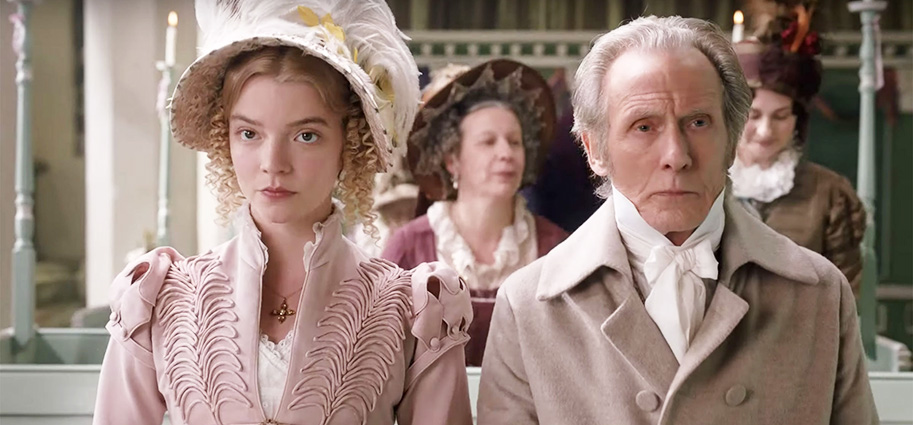
The last time audiences saw Taylor-Joy clad in period garb it was of a much dirtier sort in THE WITCH, and now in an age of wealth and refinement, she turns in an equally vexing performance as the endlessly bright and colorful Emma. Perhaps the spitting image of the character Austen envisioned when she wrote the story over 200 years ago, she is constantly exuding a cleverness and charm about her, bringing to life a character who playfully mocks the expectations set before her and other women like her at the time. She laughs in the face of marriage and romantic love, and rather uses her desire for drama and self-gratification by playing the matchmaker around the picturesque town of Highbury. Her character can be cold and manipulative, which may make her a bit unlikeable, but that’s also the character. She’s a high society version of the gossip queen in high school, manipulating with her charm. Part of her journey is seeing that change and error in her ways, and Taylor-Joy sells every moment with grace, humor and tinges of sadness, all underneath a cavalcade of immense hats.
While Austen’s stories are timeless, the great fun of bringing yet another adaptation to the screen is getting to use that time to indulge in those refineries. In the case of EMMA., which almost exclusively takes place in one glorious mansion or another, there's hardly a moment that goes by when there isn't decadent production design enveloping every frame. After we’re treated to the book’s opening words at the start of the movie (“Emma Woodhouse, handsome, clever, and rich, with a comfortable home and a happy disposition, and had lived nearly twenty-one years in the world with very little to distress or vex her.”), de Wilde wastes no time establishing the beauty of her movie’s tapestry, showing Emma, and a few of her dutiful servants, gathering the finest flowers around her property like an obscenely wealthy angel.
Whether it's with Emma’s cascading blonde curls, her endless supply of colorful gowns, elaborate hats and headdresses, Mr. Knightley’s well-fitting, stylish coats and boots, or even Mr. Elton’s (Josh O’Connor) absurdly large collars, there’s always something to marvel at from costume designer Alexandra Byrne’s creations. Pairing like a fine set of trousers, everyone can’t help but look all the more splendid when through cinematographer Christopher Blauvelt’s lens, capturing the pristine hillsides of Highbury through gentle winters and sunshine-filled summers. There are so many moments filled with so much beauty and fanciness that you could easily find yourself lost in all of the story’s beats.
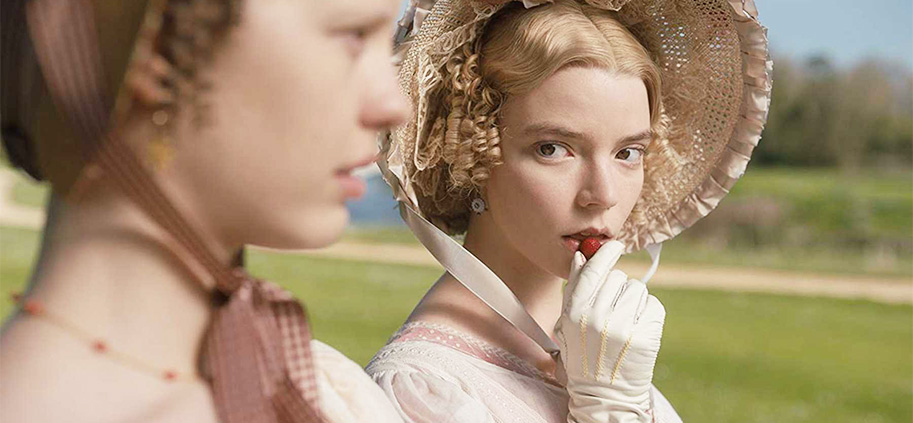
The rest of the cast is fleshed out by veterans and newcomers alike, with much of the screen time going to Flynn’s Knightley when not on Emma. He’s poised and measured as the character should be, and is literally filmed in a more revealing light, getting to show his bare bottom in a movie that may seem too tame for something like that. He has great chemistry with Taylor-Joy that allows for seemingly effortless banter, but beyond an intimate dance and a quiet moment just before it, their romance feels typical for the genre come the end, with unspoken feelings bubbling to the surface without a ton of romantic heft.
Fleshing out the deeper supporting cast, Bill Nighy gets some (but not enough) time to shine as Emma’s father, a man who is constantly chilly and seems fed up with high society but is also not the kind of man to say so. Then there’s Miranda Hart’s Miss Bates, a sympathetically goofy figure who can steal a scene with her annoyance of Emma, and as far as humor goes will certainly win the most laughs from audiences. Goth and Turner don’t get to do much other than be the exact people everyone else assumes they are, with the former coming off too happy-go-lucky for her own good, and Turner not having the material to go beyond the strapping lad all the women seem to want despite not having much to offer beyond looks. They're fine in the roles, but they can't help but always come as a second fiddle when alongside the likes of Taylor-Joy, Nighy and even Flynn.
With so many adaptations of the material out in the world, it’s hard to look at one so precise and faithful as EMMA. and be able to say it’s the end-all-be-all of them. It looks stupendous, was made with love, and gives Taylor-Joy the right amount of material to steal the show as the title character should. It’s a loving, funny, sumptuous retelling that basks in the genius of the woman who created it two centuries ago, and adds just enough cleverness of its own to fit right at home in the modern era – until it’s all done once again in 20 years.


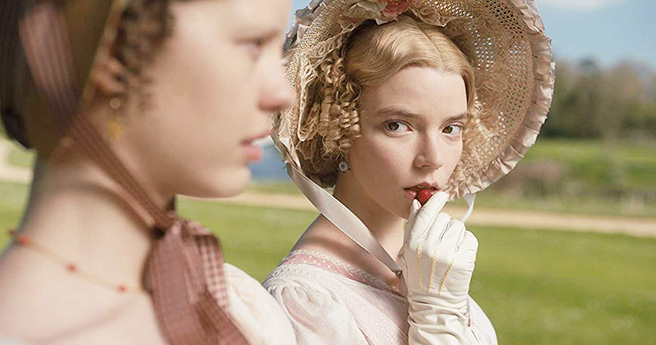




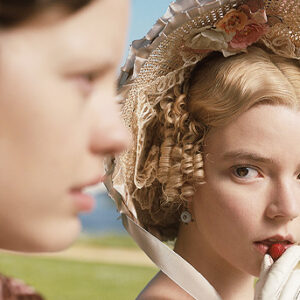
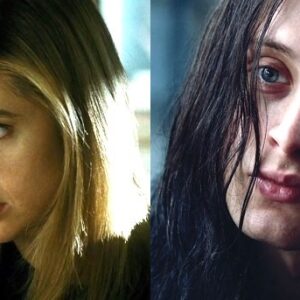












Follow the JOBLO MOVIE NETWORK
Follow us on YOUTUBE
Follow ARROW IN THE HEAD
Follow AITH on YOUTUBE